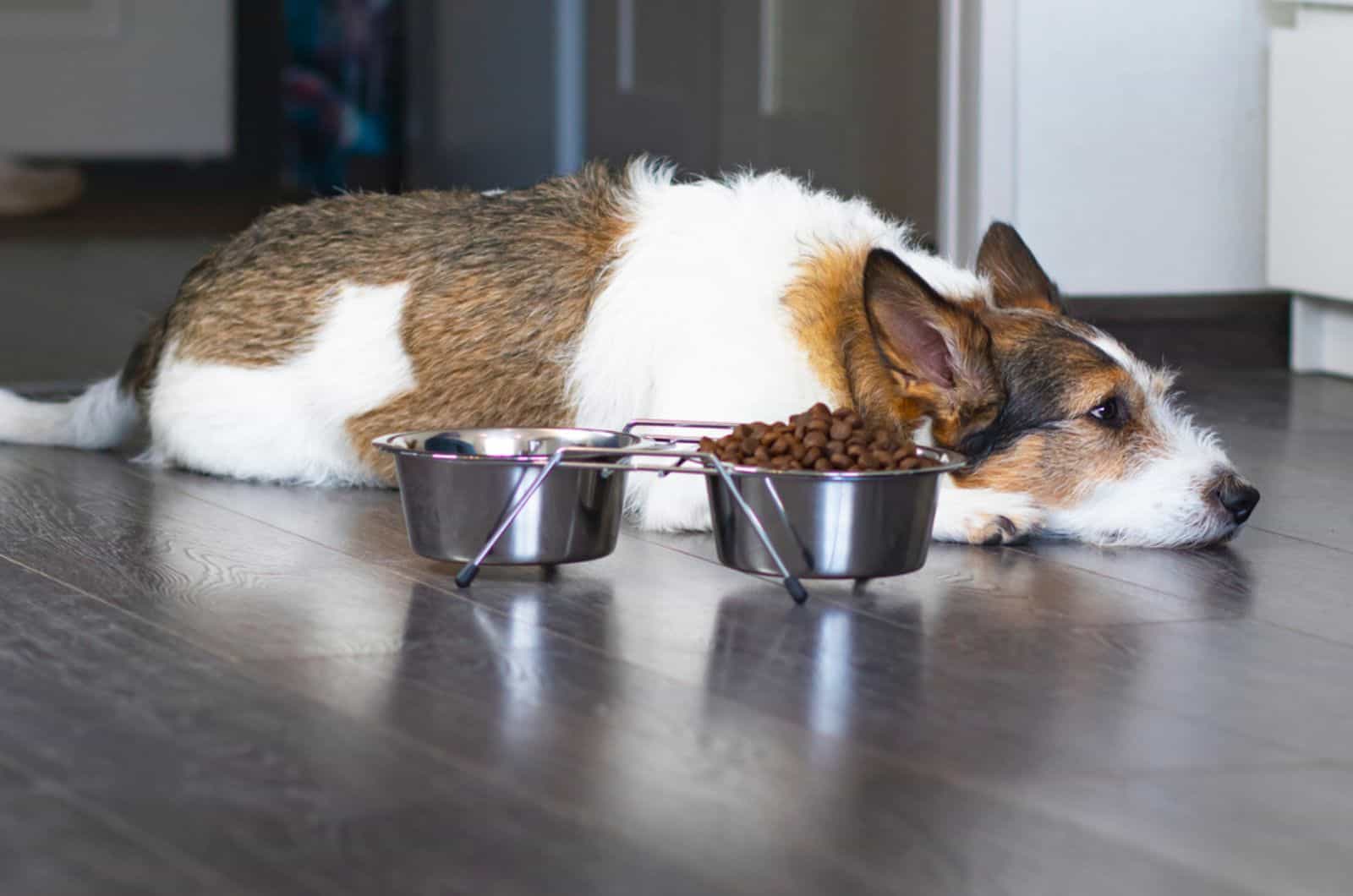How many times have you searched for home remedies for a sick dog not eating?
If you’re an experienced dog owner… probably a lot. But, if you’re a first-time dog owner, this might be the first big issue you’re facing.
Dogs will lose their appetite, and in most cases, there will be an underlying cause behind it. Whether it’s a recent vaccination or something severe, like indigestion, appetite loss will be present.
So, how do you help such a dog? Is there anything you can do to stimulate its appetite?
Of course, there is, but first, you need to find the cause of it. Appetite loss in dogs can either be partial or complete, and it can affect dogs of all genders, sizes, breeds, and ages. This is a serious problem that must be addressed quickly.
No dog owner wants to see his dog down and not eating.
That’s why we have these 8 home remedies for a sick dog not eating!
A little disclaimer: you should only try these remedies if your dog is experiencing mild changes, and his appetite loss isn’t because of something severe.
8 Home Remedies For A Sick Dog Not Eating
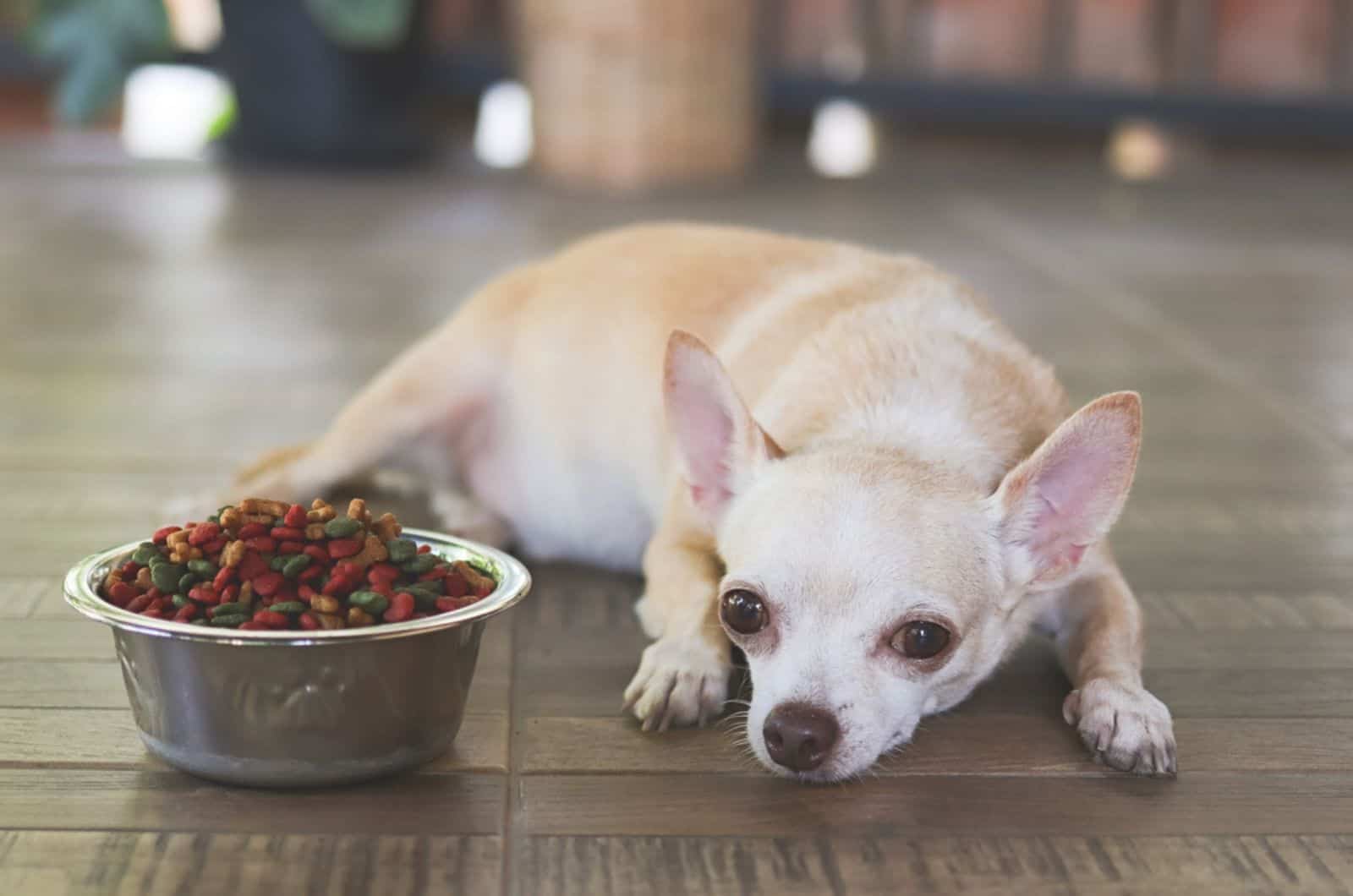
I’m not a huge fan of home remedies because a lot of things you see on the Internet are not really true. However, some remedies actually work, and are beneficial for your dog.
When we’re sick, food is the last thing on our mind. In a lot of cases, the doctor will prescribe us some appetite enhancers to make us eat again.
You can think of home remedies for sick dogs not eating as being those same appetite enhancers, along with other remedies that will relieve your dog of conditions like vomiting, diarrhea, or high temperature.
These natural enhancers should help with their appetite as well as stop weight loss.
Here are the most common ones!
Ginger
I swear by ginger. It has helped me and my dogs so many times on numerous occasions!
Ginger helps a lot when your dog is feeling nausea and/or is vomiting. Ginger will stop the nausea, and once it’s gone, your dog should be interested in food again. Of course, this only works for some mild cases of appetite loss.
Lately, I’ve seen some pretty cool ginger dog treats that could help a lot with dosing this spice to our canine buddies. It’s definitely much easier to use them than ginger powder, which dogs always seem to avoid.
Chicken Broth
Chicken broth is one of the biggest appetite enhancers for canines. Whether you pour it over your dog’s kibble to make mush, or use it as a part of homemade meals, it will be a delicious addition to the dog’s diet.
Chicken broth is very beneficial to your dog’s diet. It’s basically water in which chicken meat and bones have been cooked. It’s full of released flavors, and it contains goodies like proteins and minerals.
But, the many benefits of chicken broth only work when you make it alone at home. If you’re using processed canned food, you won’t find many goodies hidden there. Also, such products are high in sodium, and that’s something you should avoid.
Baby Food
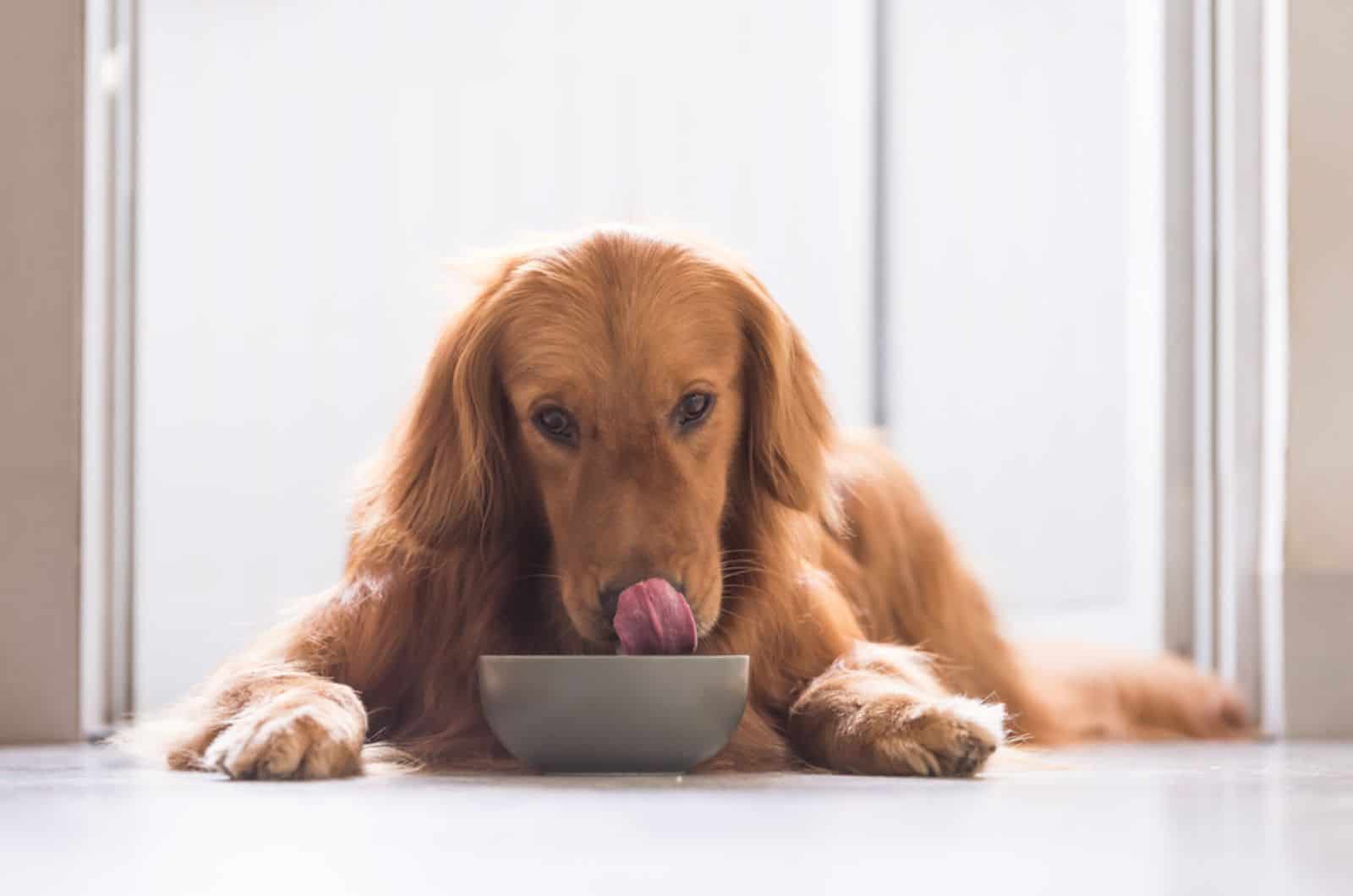
When puppies start on solid foods, they’re not eating hard kibble. Instead, they’re being introduced to puppy mush, which is basically softened dog kibble with warm water or puppy formula. It slips right down their throat, and helps them learn what eating food is all about.
They already know how to nurse, but swallowing kibble is yet to be learned.
Baby food is pretty simple in terms of flavor. Many dogs don’t like certain kibble types because they have sharp flavors.
To get them interested in eating again, you can prepare small baby food meals of runny consistency. They work well, especially if your dog has been experiencing health problems.
Rice & Chicken
Any time my dogs are sick, I put them on a bland diet. Chicken and rice go very well together, and they’re a much-welcomed meal for an empty stomach. They may not be as pleasing as other meals, but sometimes when your dog is experiencing digestive system problems, it precisely needs something bland.
White rice and chicken will fill up your dog’s stomach, and calm any nausea, vomiting urges, and even diarrhea. It won’t irritate your buddy’s tummy, and the meal will definitely stay there. Hopefully, it will also remind your dog what it’s like to eat normal food again.
Probiotics
While I always recommend natural probiotics found in yogurt and cream, there are situations in which you shouldn’t use them.
If your dog is vomiting or having puppy diarrhea, you shouldn’t try natural probiotics because you can make things even worse.
Instead, opt for probiotic supplements that should treat your dog’s digestion and make him run like a clock again.
Probiotics will introduce good bacteria again into your dog’s stomach, and fight any urge to keep emptying the stomach’s contents. Dogs that won’t vomit will most certainly eat. Their condition should stabilize rather fast.
If your dog isn’t experiencing digestive issues, like vomiting, you can try adding a spoonful of yogurt to your dog’s regular food, especially if your buddy likes to eat dry food. Not only will it make the food taste better, but it will also make it softer and easier to digest.
Soft Human Foods
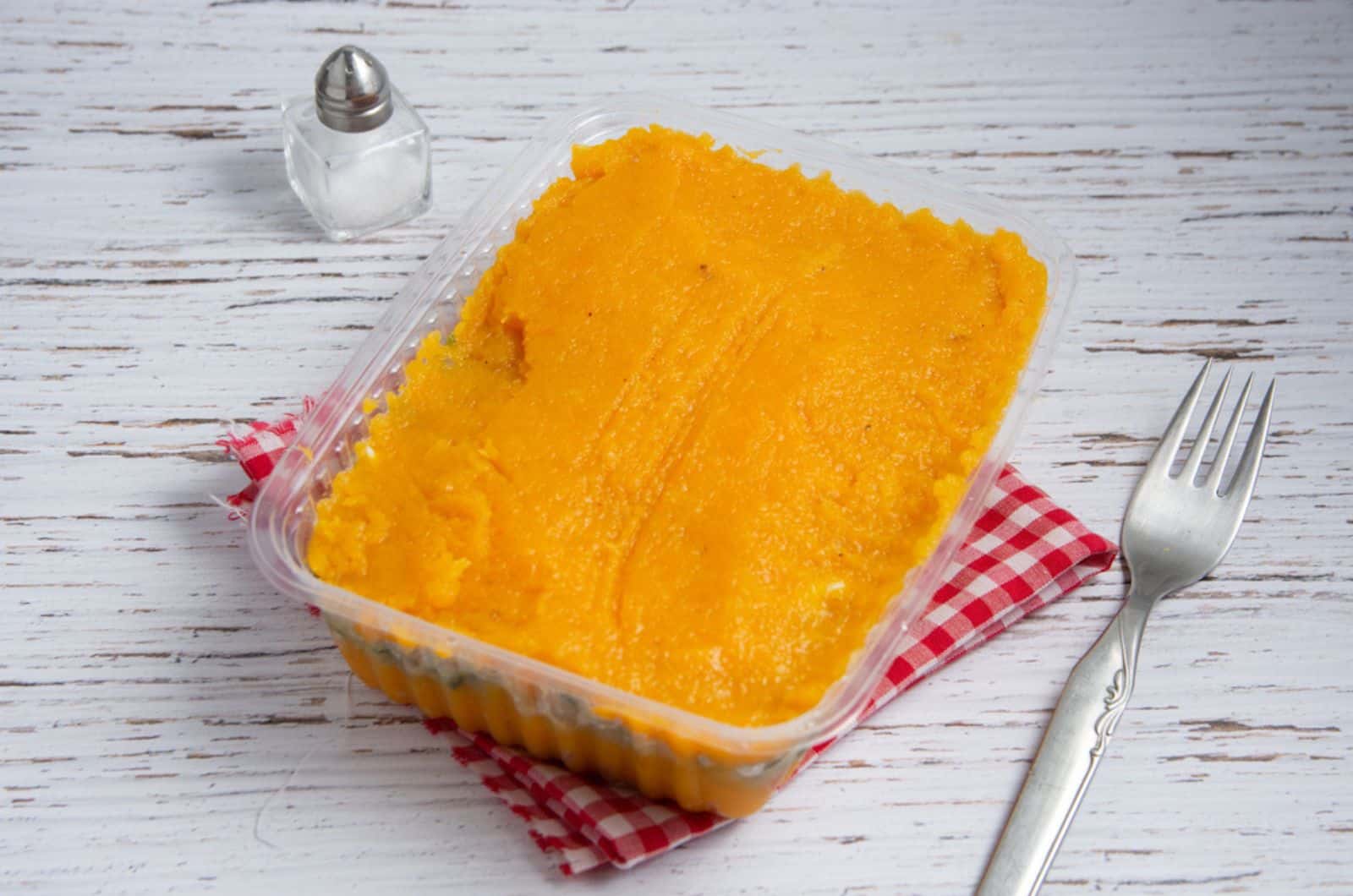
Of course, this doesn’t mean you should give dogs our meals… all soft and mushy. When I say soft human foods, I mean things like pumpkin puree.
Pumpkin puree works very well both as an appetite enhancer and a digestion aid. Dogs love the taste of it, and the texture makes it easy to eat. Dogs that are experiencing dental issues, like black gums, and thus, are not eating find pumpkin puree pretty helpful. It keeps them full, and it doesn’t hurt them while eating.
Of course, none of these home remedies for a sick dog not eating should be used if your dog vomits, especially not pumpkin puree. Use it only if you see mild signs of food rejection.
A word of advice is to use homemade pumpkin puree. Those that come in cans are packed with additives, and taste nothing like the real deal. The real pumpkin puree will give your dog satisfaction and the much-needed fibers.
See Also: Pumpkin Seeds For Dogs — 9 Health Benefits Of Pumpkin Seeds
Herbal Appetite Enhancers
It’s safe for dogs to consume certain herbs and veggies. They taste delicious, and they bring so many benefits. If you only knew how good some of them are for your dog, you’d introduce them on a daily basis.
Any new food should be introduced with caution, so don’t expect chamomile or celery seeds to work immediately for your dog. There are still chances that he might not like it.
The practice has shown that dogs that have consumed peppermint tea show signs of having an appetite after a long fast. Peppermint is a natural appetite booster, and very kind to your dog’s stomach. I recommend you do this with teaspoons. Only a couple of them should do the trick.
Rotisserie Chicken
Find a dog that will say no to hand-feeding it rotisserie chicken bits. All dogs enjoy it no matter how low their appetite is. Chicken is one of those proteins that suit almost all dogs. It’s mild in flavor, but extremely delicious and nutritious.
Dogs enjoy all parts of chicken equally, from pure meat to meaty bones.
Of course, the rotisserie chicken shouldn’t be spiced up and made for humans. Try plain chicken, skinless and boneless first. You should notice how your dog’s pupils widen when he senses the smell of chicken. If he’s in no life-threatening situation, he should jump up and ask you to feed him some of that delicious-smelling treat.
I promise… no dog, no matter how picky he is, says no to chicken unless he’s in a really poor condition.
Medicine Over The Counter
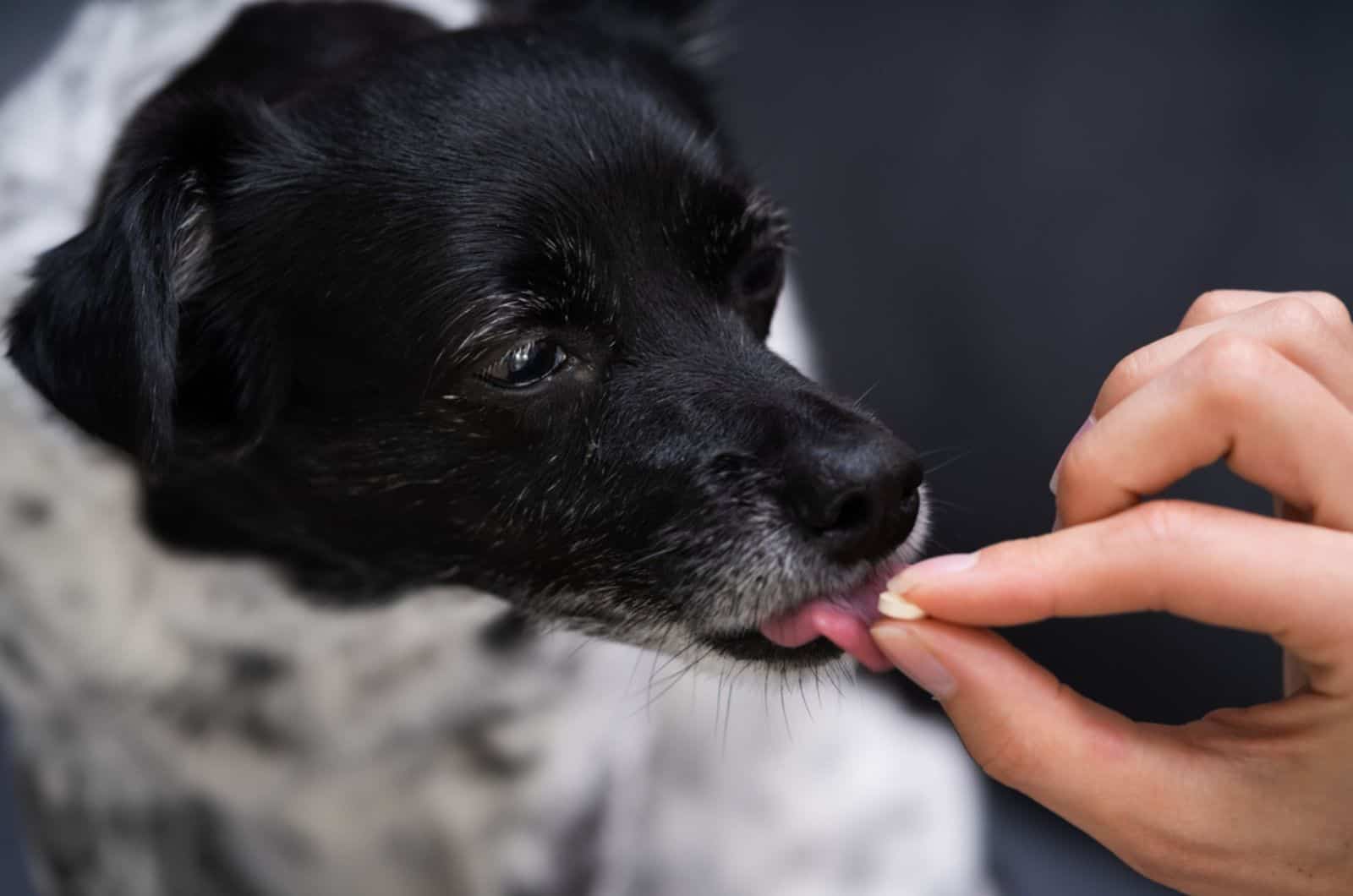
I recommend introducing over-the-counter medicine only if your dog’s behavior isn’t questionable, and he’s not acting depressive or down. Let the vet handle everything more severe than standard appetite loss.
Medicine that can be sold over the counter can be used to treat a dog’s appetite loss. Medications like Pepto-Bismol and Imodium can stop vomiting and diarrhea, and thus, have your dog eating again.
To repeat this one more time: only use these medications if you’re certain it’s only appetite loss – not something severe like kidney failure, which prevents your dog from eating.
Ask your pharmacist about the amount of such meds, and keep an eye out for potential reactions. Sometimes, a dog’s sensitive stomach might find meds aggressive, and they won’t do any good.
Why Isn’t My Dog Eating?
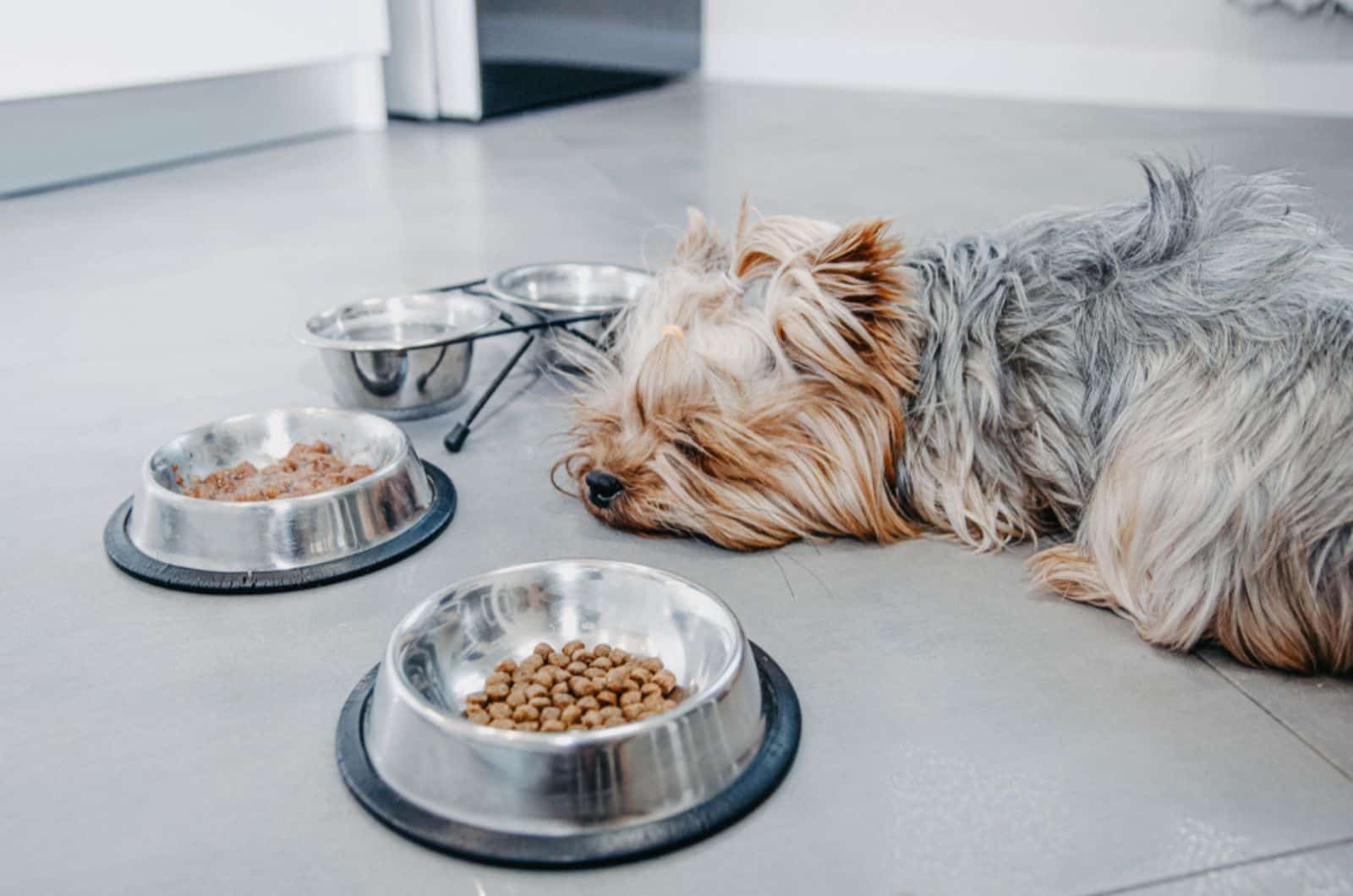
There comes a time in every dog owner’s life when he has to wonder: Why isn’t my dog eating?
I won’t lie to you… it will be harsh, but you should not panic. It’s not unusual for dogs to stop eating abruptly. The reasons behind it are numerous, and along with fairly normal behavior, they shouldn’t be too alarming.
However, problems occur when there are certain health problems with symptoms like high body temperature, drooling, depression, lethargy, energy loss, vomiting, diarrhea, etc. Side effects of some conditions, like pancreatitis, should not be ignored.
We can’t say for sure why your dog isn’t eating. All we can do is assume. But, your veterinarian should be able to quickly figure out why your dog doesn’t eat, and how to help him.
The reasons for appetite loss are multiple, and now, we’re about to discuss them all. You can’t treat a problem without knowing what is causing it!
See Also: How To Comfort A Dog With Pancreatitis: Remedies & Relief
What Are The Most Common Reasons For A Sick Dog Not Eating?
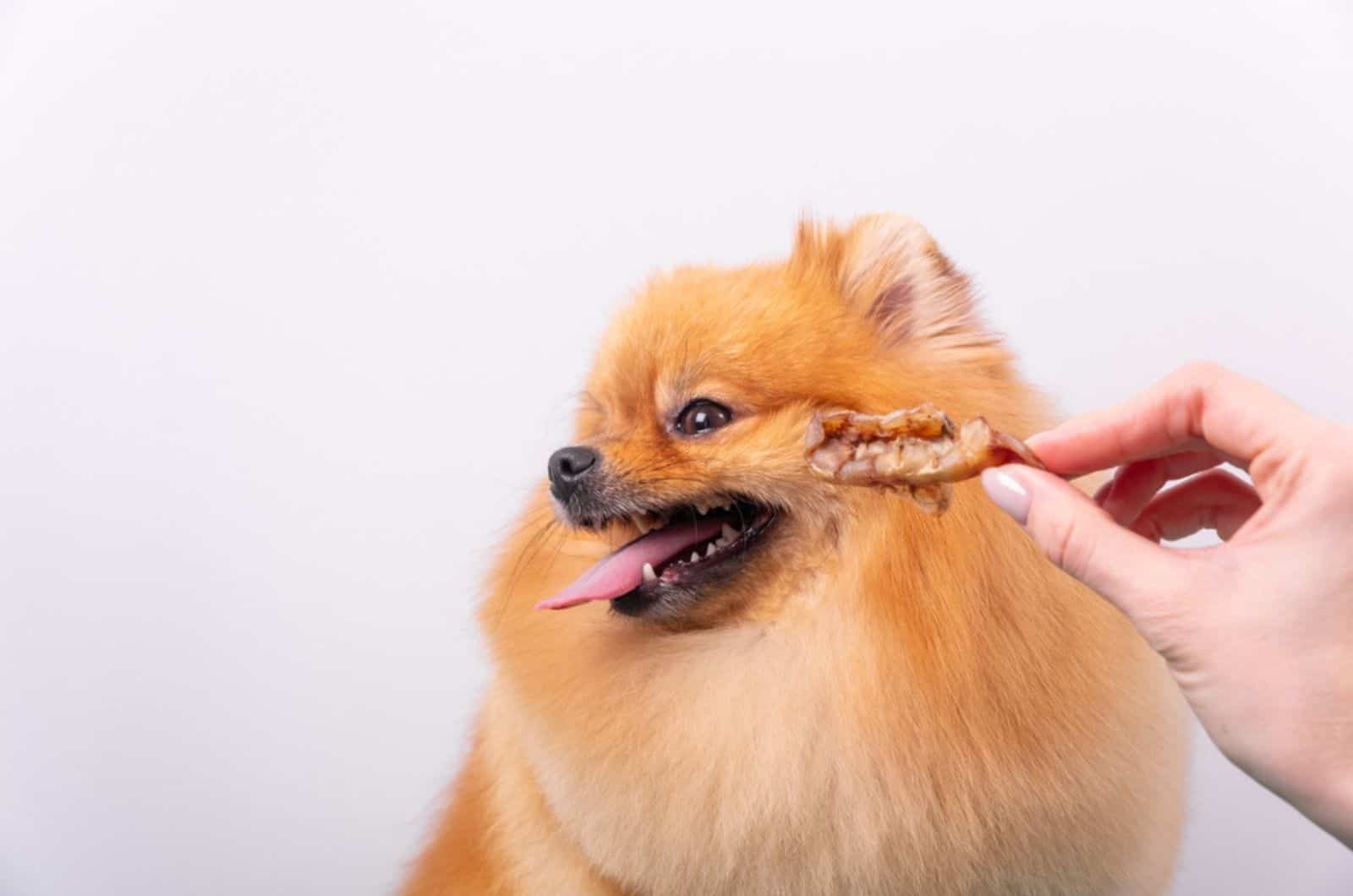
I already mentioned that the reasons why your dog is not eating are multiple. Now, we will discuss them all, including the least dangerous and the most dangerous ones.
Sometimes, an issue can be really ridiculous and obvious, such as disliking the food. But, sometimes, the reasons have a deeper nature. It’s absolutely okay if your dog doesn’t eat for a day or two. However, if symptoms like lethargy come along, then you’ve got some problems to solve.
Here’s what you should watch out for!
Dietary Issues And General Disliking
Not every dog shares love for the same food. It would be ridiculous to expect from your dog to like the first dog food brand you pick for him. The harsh truth is that a lot of dog owners go through multiple dog food brands just to find the one that suits their dog.
Unfortunately, in a lot of cases, the new dog food might become too boring for their canine after a while. This is absolutely normal. We don’t like eating the same food over and over again, so why should we expect that from our dogs? They love diversity, too, so make things interesting for them.
In a lot of cases, dogs avoid a specific food because it’s too bland. This happens a lot to dogs on a sensitive diet because of allergies or specific health conditions.
Also, transitioning between kibble recipes, or from wet food to kibble or homemade meals can be followed by your dog’s lack of appetite. They might get confused with the change and decide to avoid their meals because they don’t suit them.
Dietary issues happen a lot when a kibble brand has a terrible ingredients list. Dogs won’t eat something that’s proven to give them stomach issues. While it may smell yummy to you, it may not suit your Fido.
Also, many dog owners forget to check the expiration date, and that could be a clear reason why your dog isn’t eating.
Changing its food or introducing some delicious topping is the first thing you must do when you notice your dog has not been eating his meals for a while.
The World Around Them
Dogs should have a safe spot inside the house where they have their food and water bowls. That place shouldn’t change because dogs pick up routines pretty fast. You should be able to figure out where he likes to eat his meals the most.
I had a friend whose dog did not want to eat unless the person sat on the table to eat breakfast with him. Another friend had a little Chihuahua that was too shy to eat when someone was around, especially the house cat.
Dogs seem to have issues with the most random things, but who are we to judge?
If your dog doesn’t like his surroundings; for example, if you’ve changed his feeding spot, he might protest by avoiding food. Try switching it back to where it was before.
Another issue occurs when big life changes happen in your life. Moving is one of them. It’s not rare for dogs to lose their appetite if they move and seem to have issues adapting into the new house.
In a lot of cases, bringing in a new pet, no matter if it’s a dog, a cat, or a hamster, might result in canine anorexia. This loss of appetite is almost like a protest for making such a change.
The bottom line is – look for clues around you. Any change, even if you think it’s the smallest one, can result in your dog avoiding his meals.
Stress And Behavioral Issues
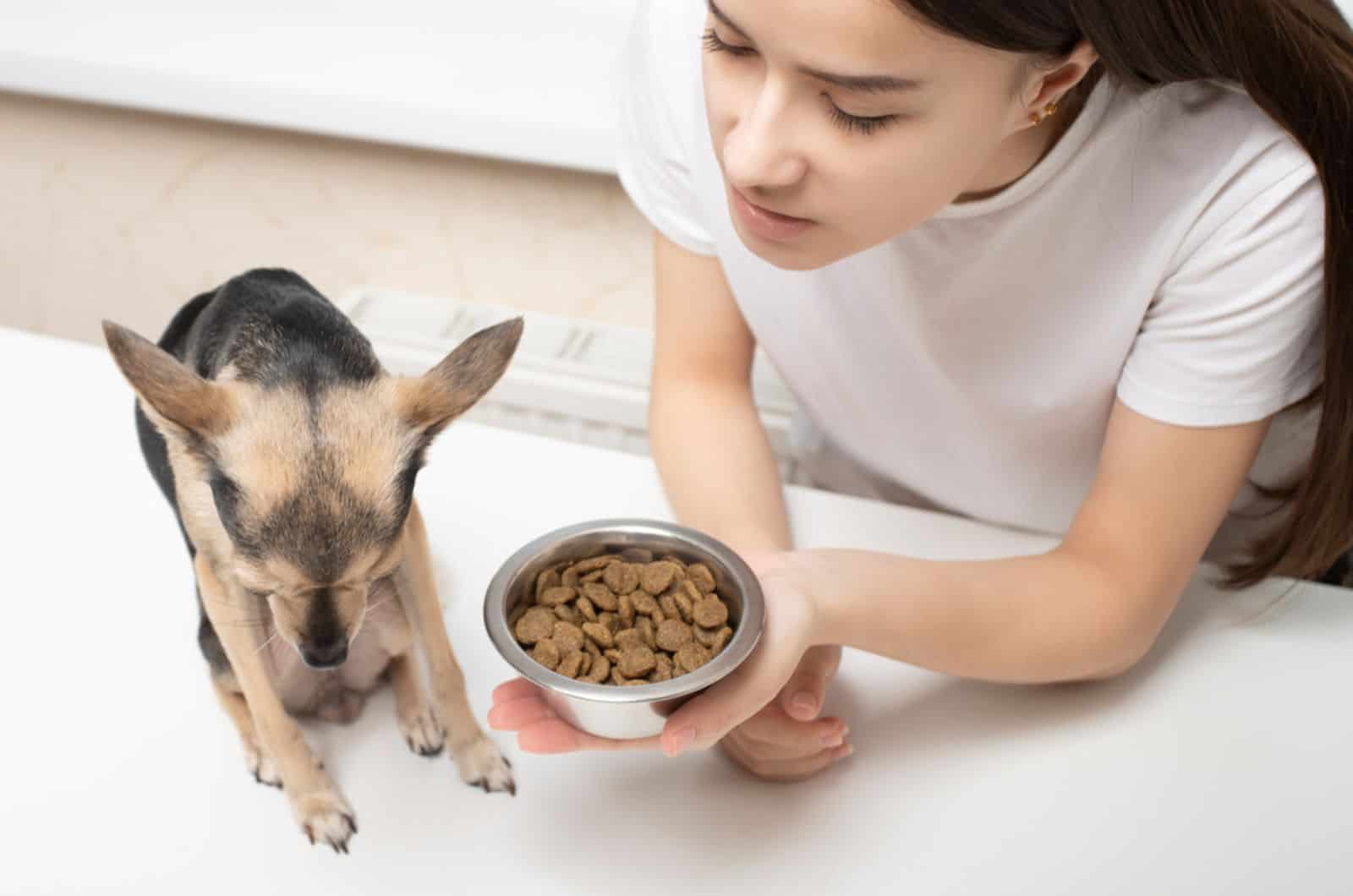
Unfortunately, stress is a huge culprit of many problems, including the one with your dog’s appetite. I can’t even begin to describe how much damage stress can cause to your dog. Some breeds are more prone to responding badly to stressful situations, while some are not.
If you believe that your dog is affected by stress a lot, you should try to find the trigger that makes him feel stressed out. My mother had a dog that hated when someone rang the doorbell. It went so far that she even tried switching the ringing sounds. Even the bird-chirping bell annoyed him and made him shake.
Naturally, she had to take it out and ask everyone to knock on her door. Her dog then didn’t have any more issues with stress, and he soon began acting all normal. However, before that, he was constantly shaking, and eating only a half of his usual meal.
Behavioral issues like this one, which was caused by stress can be linked back to early puppyhood. It’s the breeder’s task to make sure that all puppies are desensitized to harsh sounds, unusual smells, and uncommon situations. It’s a part of their early socialization process.
Stress can be a reason why your dog acts strange, i.e., starts eating grass all of a sudden.
A puppy that hasn’t been through socialization or has had problems with understanding lessons will most likely exhibit similar problems.
Separation Anxiety
Separation anxiety is a common disease that strikes lots of canines, and it’s not something to be joked about.
This is a serious illness that starts as a minor problem. However, if you don’t address it, it can turn into something ugly, like depression or aggression. In most cases, they go hand-in-hand together.
So, what is separation anxiety?
Separation anxiety is a condition that makes your dog super sad and anxious when you leave the house. It usually starts as being uncomfortable when you leave for a short while. But, once you increase the time you spend outside the house, the anxiety will increase, too.
Simply put: your dog doesn’t want you to leave the house and leave him behind.
In a lot of cases, dog owners try to install a doggy camera, so they can see what their dogs are doing, and maybe even communicate with them. However, that’s still not as effective as bringing your dog everywhere you go.
For example, you can bring your dog to Tj Maxx when you want to go shopping. Of course, only if he’s a trained one. Similar stores and restaurants allow dogs if they’re on good behavior, so your dog doesn’t have to stay at home while you run errands.
The easiest way you can curb separation anxiety is by not being separated from your dog.
Depression and aggression are behavioral issues and conditions that you don’t want your dog to experience. It’s almost always a one-way street with such behavioral problems.
Health Issues
The most severe of all reasons as to why your dog is not eating is some medical problems he’s experiencing.
We usually think of the worst. When a dog is ill or avoiding his meals, we immediately think he’s suffering from some sort of health problem. This can be true, but first, you need to look into the more obvious reasons listed above.
When your dog is avoiding eating his dry food, you can suspect it may be hurting his teeth. Dental problems are often a cause behind appetite loss, especially if your dog is enjoying crunchy kibble and meaty bones. They might be the least severe of them all!
Still, conditions such as parasites, allergies, infections, upset stomach, and issues with internal organs such as liver disease can all be a reason why your dog is not eating.
The important thing is to monitor your dog and inform your vet about his condition. If you notice symptoms such as high body temperature, vomiting, sleepiness, lack of energy, or lack of enthusiasm, you should rush your dog to the vet immediately.
What Do You Do If Your Sick Dog Is Not Eating?
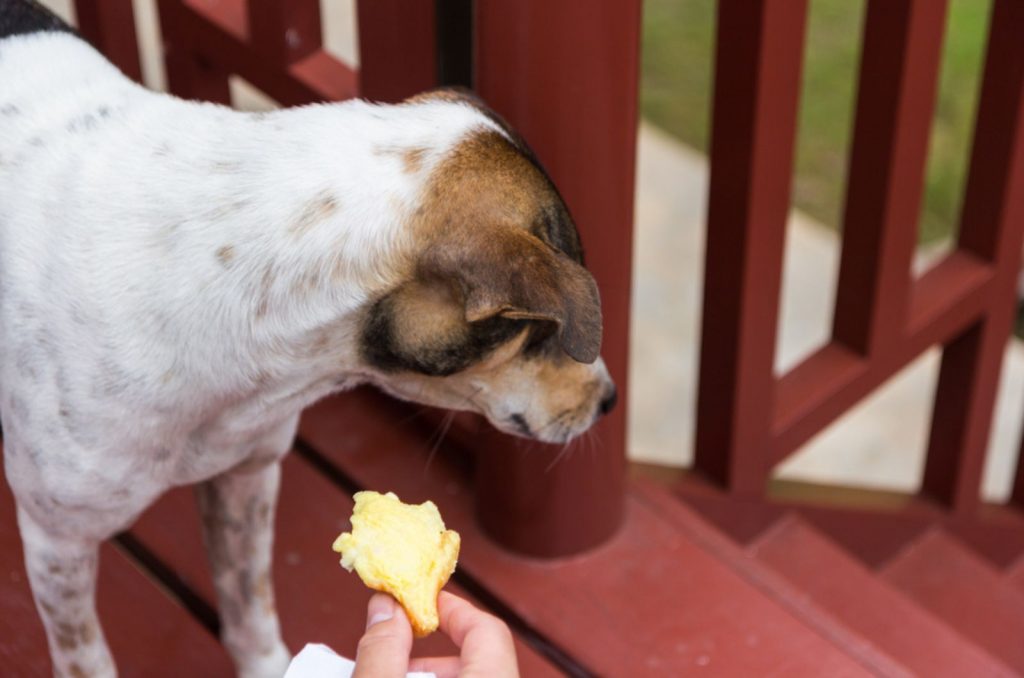
The most important thing you can do is monitor your dog.
Skipping one meal is not alarming… it happens. Your dog might not be in the mood. Try offering food later. If it continues to happen, you should try to offer him some tasty food or something he usually likes to eat.
A lot of dog owners try to add their favorite treats into the bowl, so their canines start munching on them. In case this fails, too, then you’re definitely in a problem.
Remember when your dog went potty the last time. Dogs poop usually twice a day, so if he skipped it today, he might be constipated or experiencing some sort of an intestine blockage. There are lots of useful home remedies for dog constipation you should check out.
Digestive problems are quite common, so wait until they pass, and try to hydrate your dog as much as you can.
If the appetite loss still continues, it’s time to seek veterinary attention.
Your vet will first check your dog’s digestive tract for any obstruction. Then, he will run tests for intestinal parasites, especially if symptoms like high temperature persist. It takes a while to figure out the underlying cause.
What I can advise you is not to experiment with treating your dog at home, especially if it’s a puppy or an older dog. Let the vet handle your dog, start him on liquids, and watch as the situation develops.
A Word Of Advice

Letting your dog fast for a while is okay, especially if he’s bouncing back from some sort of severe condition. You can’t expect your dog to miraculously start eating after he has been without an appetite for days. It happens, but it’s super rare.
Dogs need time to adjust to any diet changes.
The most important thing you can do to help your puppy get better soon is offer him a lot of water, so he doesn’t dehydrate. Vets also recommend handing out a bit of Gatorade or any other electrolyte substitution to prevent a dog from dehydrating.
Pedialyte works well, too, but run this by your vet first.
Dehydration is very dangerous for your dog, and it shouldn’t be messed with.
If you want to learn more tricks, and figure out what to feed your dog that isn’t eating, look here.
FAQs
I understand how desperate you can be if your dog is not eating, but there are some things you shouldn’t do. It doesn’t matter how good your intention is – you shouldn’t try to force-feed your dog.
Nothing good comes out of force.
You should never grab a handful of kibble and shove it down your dog’s throat. Your dog can choke on it! Also, you can annoy your dog, so that he becomes a bit aggressive every time you come close to his mouth.
If you really want to show your dog that his food is yummy, and encourage him to eat, you can smear some puppy mush on his lips and let him lick it off. This may show your dog how delicious his food is, and what he has been missing out on.
Desperate needs call for desperate measures. If your pup is in very bad condition, and your vet advises feeding him at least a bit of dog food, you can use a syringe and feed your pup. Squirt some liquid puppy food into his mouth. Aim for the cheek, not the throat, or your dog might choke.
Every dog should have access to fresh water daily. Some dog experts have even calculated how much water certain dog breeds should take in every day. Personally, I let my dogs drink as much water as they want, but I monitor if it’s too much or not enough at all.
Usually, dogs drink about 1 ounce of water every day. The amount can vary a bit, but that’s the general rule.
The problem occurs when your dog starts drinking too much water and stops eating altogether.
Excessive drinking is more than the recommended 1 ounce a day, and it’s a clear sign of severe conditions like kidney failure.
There are lots of reasons why your dog is avoiding his food, but not his treats.
In most cases, it’s because your dog prefers the taste of the treats more than the taste of the food.
Whether we like to admit it or not, we like to spoil our pups. But, we’re not doing a favor to our dogs. We’re teaching them that it’s okay to munch on treats anytime they ask for them. Sooner or later, our dogs will completely stop eating their food and demand treats only.
This is a completely spoiled behavior, and we dog owners should never let them have it this way.
Treats should be limited to no more than 10% of their daily caloric intake. I recommend you save them for training lessons or when your dog does something good.
Handing out treats deliberately or having them accessible all the time can do nothing good to your dog. Treats lead to obesity, and that’s not something you want for your dog, especially if it’s a small breed.
There is more on a dog avoiding food, but not treats here.
Experts say that dogs can go without food for seven days. But, I hate to think how long some dogs on the streets go without food. It’s definitely more than a few days, and it breaks my heart.
Just because they can doesn’t mean they should.
If you notice that your dog is not eating well, you shouldn’t let him strike for more than two days. Anything over that is a warning sign, and requires veterinary help.
While on this food strike, make sure that your dog takes in enough water, so he doesn’t dehydrate. Dehydration is the last thing you need!
To Sum Up…
I really hope these home remedies for a sick dog not eating will help your canine.
Remember, dog food is not the same as human food. We shouldn’t just think it’s fine for our pups not to eat for a while. They need food as fuel to keep them moving. Any lethargic behavior is a clear sign that your dog is in distress.
Unfortunately, loss of appetite in dogs is a common situation, and it happens for numerous reasons. The most important thing is to find what causes it, why your dog is sick, and find a way to treat it.
As you could see, lots of home remedies can be used to cure your dog’s lack of appetite. But, remember… these all work only if your dog has a mild condition of appetite loss. Anything more than that should be addressed by the vet.
You shouldn’t let your dog go without food for more than two days. Drinking water regularly is a good sign, but it’s still not something you shouldn’t worry about.
Let the vet handle the situation if you believe it’s much worse than just general food disliking or an upset stomach. Medical issues should be treated without hesitation.
Read Next: How To Treat A Limping Dog At Home? First Aid Help Guide
